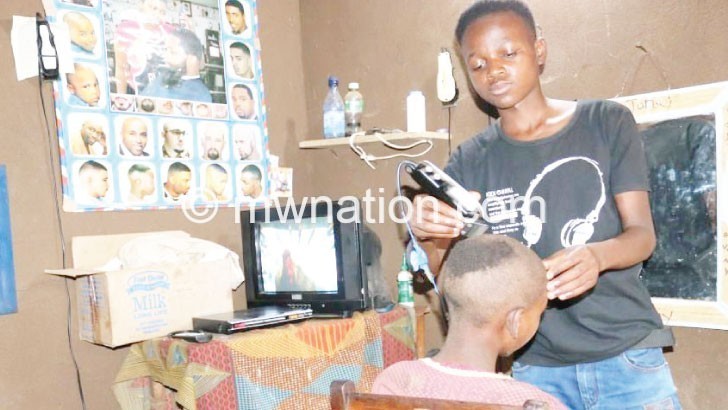Rural Malawians keep fleeing to urban settings in search of better jobs and business opportunities, an exodus made worse by lack of electricity.
According to Electricity Supply Corporation of Malawi (Escom), just one in 100 rural Malawians is connected to its overhead power lines.

However, the picture is gradually changing and urban migration is waning as Malawi Rural Electrification Programme (Marep) brings electricity to rural dwellers’ doorsteps as is the case in towns and cities.
Since 1980, the State-run rural initiative has been connecting remote trading centres to the national grid, easing the way people live and do business.
Patricia Namale, a divorcee, owns Aunt Susan Salon at Ngolowera Trading Centre in Traditional Authority (T/A) Chikumbu, Mulanje.
“I don’t really feel the impact of my marital status because I fend for myself and take care of my child with the proceeds I get from my salon. I am indebted to Marep, which brought electricity to our area. Previously, I couldn’t have opened this salon,” she says.
Namale left Blantyre City after the breakdown of her marriage in 2017.
“At first, life was tough. I could not fend for myself and my two-year-old daughter. Realising my hairdressing skills, which I learnt in town through interaction with fellow women, I decided to open this salon to generate some money for my household,” she explains.
Namale opened the salon days after President Peter Mutharika switched on Ngolowera power line on April 5 2017.
To Mutharika, offering rural communities affordable electricity for household and commercial use is a cornerstone of national development.
“Our goal is to take development to the people everywhere in Malawi. I want to see every community centre with electricity in this country. Every district will now have more access to electricity than ever before,” he declared.
Yet, Escom reports that just a tenth of the country’s population is connected to the grid. Marep, now in phase eight, seeks to connect three trading centres in every district—and Ngolowera is among 336 rural business hubs to be connected.
Speaking when he switched on Chinguluwe power line in Salima last May, Minister of Natural Resources, Energy and Mining Aggrey Masi said electricity enhances economic activities both at household and national levels.
“It helps people have more money in their pockets to improve their livelihoods,” he said.
Connecting Chinguluwe and surrounding areas to the power grid has led to the mushrooming of hair salons, barber shops, welding shops, cold drinks selling points, video showrooms and other small-scale businesses at the trading centre.
Welder Alexander Ngongondo says he no longer worries about money for basics.
“I acquired welding skills from Salima Technical College, but could not put them to productive use due to lack of electricity in my area. Today, here I am operating a welding shop. I meet my needs without relying on anybody,” he says.
Ngongondo repairs wrecked bicycles, oxcarts, wheelbarrows and cars. He also makes bicycles carriers for sale.
“On average, I make about K3 000 a day. This helps me meet my family needs,” he says.
Now, Ngongondo intends to expand his business. He plans to start fabricating door and window frames, burglar bars and other welding requirements.
Ministry of Natural Resources, Energy and Mining chief director Chimwemwe Banda commends Marep for transforming rural areas into business hubs.
She reckons the programme will continue until the whole country is covered in line with Sustainable Development Goal Seven (SDG7): ensuring access to clean, affordable sustainable energy for all by 2030.
She states: “It is interesting people in rural areas are now enjoying the luxury of electricity which used to be a monopoly of urban dwellers. Marep has brought many benefits, including improving personal health as Malawians move away from cooking using fuel wood, which made them inhale smoke, to cooking using electricity. Cooking using electricity conserves forests.”
Marep has also brought electricity to public facilities, especially schools and health facilities.
Says Banda: “Learners in schools with electricity are registering improved performance.
“They study even at night, making it possible for them to compete favourably with their urban peers. With electricity, it is easier for the teachers to prepare lessons and mark exercises,” says Banda.
Source: The Nation_May 9, 2019_Steve Pemba_Malawi News Agency
